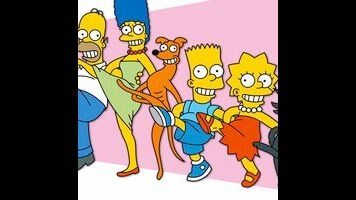The Simpsons: "Pay Pal"

With some tinkering, “Pay Pal,” the penultimate episode of this season, could have been something special. The central story, about Marge desperately trying to ensure that Lisa doesn’t grow up without friends, is the sort of family-centered plot that often produces the best Simpsons episodes. There are some good gags and a few affecting moments, and the Marge/Lisa relationship remains a fruitful one. It’s just that, like so many episodes this season, “Pay Pal” frontloads too much establishing plot, forcing the emotional core of the story into a mad rush before the final credits.
Of course, this puts me in the ridiculous position of wishing there were less John Oliver in the episode. As the Simpsons’ new neighbor Booth Wilkes-John, Oliver brings his impeccably clipped comic timing to the party, especially when hosting an actual party, an absurdly elaborate neighborhood murder mystery night (they hired a Foley artist) that Homer immediately ruins by asking dumb questions. Oliver’s line readings have the same intelligent snap as they did on Community (R.I.P.), with little logical turns which are both snarky and charming. (Seeing Marge has also brought store-bought cake to the neighborhood block party, he says conspiratorially, “We must have the same recipe: drive to store, buy cheap cake, serves them right”). I love John Oliver, and just hearing his voice gives his character some inner life, but after that first act, he’s gone—and a third of the episode with him.
That pacing problem haunts the rest of the episode, too, truncating the eventual emotional confrontation between Marge and Lisa in disappointing fashion. The setup of the main plot—once it finally gets going—is solid, with Marge, despondent over her lack of friends, paying off one of Lisa’s classmates to pretend to like jazz, kale smoothies, and, well, Lisa. One of the most resonant themes of The Simpsons is Marge and Homer’s occasional realization that their kids might turn out to have the same lives of quiet desperation that they’ve settled for. Here, Marge’s sadness and resulting actions are believably motivated, and Lisa’s isolation has been long established. Bart’s sudden interest in ferreting out why Lisa has a new pal is less understandable—he’s not jealous, and doesn’t see anything especially fishy about the girl’s actions. He’s suspicious because the plot needs him to be. That being said, the big reveal, when Bart brings Lisa incriminating pictures showing Marge paying off Lisa’s new BFF at a Krusty Burger playland is adroitly handled and effective. (I suppose the title of the episode should have clued me in.) That’s mainly due to Yeardley Smith, who, as ever, makes Lisa Simpson one of the most believable, relatable characters on TV.
As Erik Adams pointed out in his most recent Simpsons Classic review, the fact that Smith has only ever played this one character has allowed her to understand Lisa inside and out. Here, Lisa’s sense of betrayal at Marge’s meddling is layered with fear—fear that Marge’s fears are well founded, and that Lisa, like Marge, is destined to be isolated and alone. The kitchen scene, when Lisa, (clearing the room of Santa’s Little Helper, Homer, and Maggie with an icy, “You don’t want to be here,”) has it out with Marge, is animated with Lisa’s hair a little ragged and awry. It’s a small touch, but one I don’t remember seeing often (unless Lisa’s running from Sideshow Bob or something), and it, along with Smith’s performance, underscores the stakes for both of the characters here.
Which is why the denouement, when it comes, is a bit of a letdown. Smith and Julie Kavner are both great as usual, but Lisa, after stewing in her room all day, simply unlocks her door and decides to forgive Marge. The end. Smith’s great here, especially delivering the thought, “What unimaginable power! I can use this to get anything I want—but all I want now is for mom to stop crying.” And her realization that her current isolation isn’t necessarily the ticket to lifelong loneliness is a lesson all bookish, sensitive little girls (and boys) should take to heart. (College is where all of us weirdoes find each other, as she intuits.) It’s just that the structure of the episode makes this heartfelt ending go by in a rush.
Stray observations:
- Episode grade: B. (Some technical problems at the moment, but I don’t want to deprive you of a sweet, sweet letter grade. Also, feel free to read the many other letters I wrote concerning this episode!)
- It was well done, but, man, that Game Of Life couch gag was a stone cold bummer, huh?
- Marge’s shame at purchasing a store bought cake involves her kicking over her shopping cart in her wake as she scurries away.
- I could listen to John Oliver deliver lines with this construction all day: “I’ll see you Saturday next, or as you call it next Saturday,” “We’ll play charades, or as you call it Pictionary.”
- Flanders, describing his no-alarm chili: “You’ll only taste the spoon!”
- Lisa’s artistic plan when resigned to a friendless existence—long novella.
- Even Homer notices channel drift. Watching the reality show Topiary Wars: “Why was that on the military history channel?”
- I love that Marge arranged a lizard petting station for Lisa’s party.
- “The only person who showed up was Gus-freakin’-Hubner?”
- “Gus Hubner?” “I wish! That kid could play youth soccer…”
- Lisa’s reading Sex And The Single Girl.
- Homer, horrified: “Oh God, I’m the smart parent?”
- Just noticed that the fridge picture behind Marge and Lisa is by Lisa. And she’s all alone in it.
- Apologies for the lateness, gang. I’d explain about the technical problems if I understood what they were.